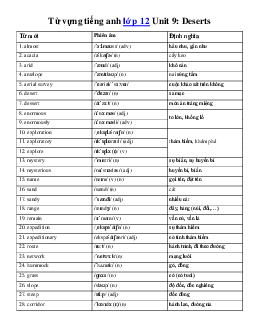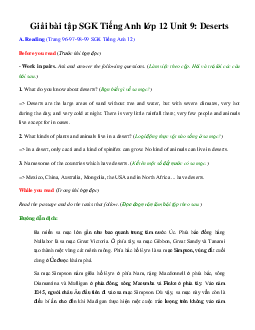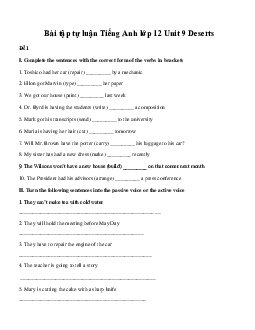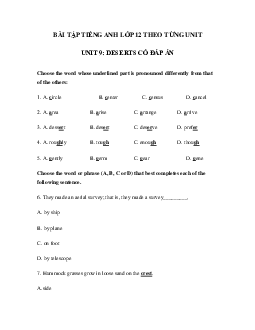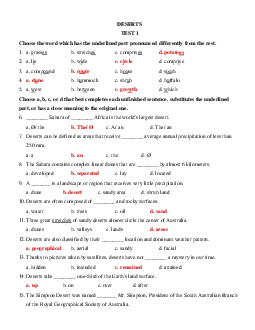





Preview text:
TEST 3
Choose the word which has the underlined part pronounced differently from the rest. 1. a. three b. south c. southern d. both 2. a. remained b. explored c. separated d. travelled 3. a. loose b. smooth c. food d. flood 4. a. enormous b. rough c. enough d. double 5. a. society b. geography c. dry d. sandy
Choose a, b, c, or d that best completes each unfinished sentence, substitutes the underlined
part, or has a close meaning to the original one.
6. ________ sand covers only about 20 percent of Earth's deserts. a. A b. An c. The d. Ø
7. Deserts have ________ reputation for supporting very little life, but in ________ reality deserts often have high biodiversity. a. a/ Ø b. the/ the c. a/ the d. the/ a
8. The hill was so ________ that it took us more than five hours to climb up. a. sloping b. enormous c. arid d. stable
9. In the northern part of the Simpson Desert, the dunes are parallel. a. mysterious b. steep
c. plenty of sand d. similar in some ways
10. Several deserts are a quite vast and uninhabited ________. a. plain b. territory c. corridor d. shrub
11. A ________ is a large animal that lives in deserts and is used for carrying goods and people. a. slope b. dune c. spinifex d. camel
12. The ________ of a cliff, or mountain, is a vertical surface or side of it. a. face b. border c. crest d. lake
13. Most deserts are enormous sandy areas. a. mysterious b. narrow c. immense d. aerial
14. Camels were often used _______ transportation by people of the desert. a. as b. with c. to d. about
15. Camels have one or two humps used ________ storing water and food. a. to b. for c. over d. at
16. Many tall and wide mountain ranges do not let much rain get ________ the desert. a. into b. away c. out d. from
17. I wanted to go a more ________ route across Montana. a. north b. northerly c. northerner d. northernmost
18. We often enjoy walking barefoot across the damp __ to the water's edge. a. sand b. sanding c. sandy d. sandily
19. If the deserts are ________ managed, there may be troubles for scientific expeditions. a. loose b. loosen c. loosening d. loosely
20. He told me not to do it; ________, I did it. a. Therefore b. So c. But d. However
21. We have not yet won; ________, we will keep trying. a. moreover b. however c. therefore d. so as
22. I am afraid that the company is in deep trouble. ________, we are going to make some people redundant. a. Therefore b. However c. But d. And
23. I wanted to give him some money after he helped me with the car ________ he absolutely refused to accept it. a. so b. but c. therefore d. and so
24. Everyone is ready for the discussion, ________ him. a. however b. but c. so d. therefore
25. ________ she could not say anything.
a. So upset was she that b. So upset was she
c. However upset was she that d. Therefore upset was she that 26. Do it ________. a. so do you want b. but as you want c. however you want d. therefore you want
27. ________ you prepare for the exam, there will still be a few questions on which you won't be sure of the answer. a. So much as b. Much but
c. However much d. So much
28. The first part of the test was easy; the second, ________, took hours. a. therefore b. but c. so d. however
29. ________, I cannot keep pace with Johnny. a. So I have tried hard b. I have tried hard so c. However hard have I tried
d. However hard I have tried
30. He has done nothing to prepare for the final examination, ______ played. a. but b. so c. therefore d. and
Choose the best sentence that can be made from the words given.
31. The Arabian Desert/ third-largest in the world/ cover/ nearly 1 million square mile of the Arabian Peninsula.
a. The Arabian Desert, is third-largest in the world, covers nearly 1 million square mile of the Arabian Peninsula.
b. The Arabian Desert, that is third-largest in the world, covers nearly 1 million square mile of the Arabian Peninsula.
c. The Arabian Desert, third-largest in the world, covers nearly 1 million square mile of the Arabian Peninsula.'
d. The Arabian Desert, third-largest in the world, therefore, covers nearly 1 million square mile of the Arabian Peninsula.
32. It/ the sandiest/ all deserts/ no river/ flow through/ originate from it.
a. It is the sandiest of all deserts, with no river flows through and originates from it.
b. It is the sandiest of all deserts. No river flows through or originates from it.
c. It is the sandiest of all deserts, but no river flows through or originates from it.
d. It is the sandiest of all deserts. Therefore, no river flows through or originates from it.
33. Arabia's rainfall/ average only 2-5 inches a year/ two- year droughts/ not uncommon.
a. Arabia's rainfall averages only 2-5 inches a year, and two-year droughts are not uncommon.
b. As Arabia's rainfall averages only 2-5 inches a year, and two year droughts are not uncommon.
c. Arabia's rainfall averages only 2-5 inches a year, which makes two year droughts are not uncommon.
d. Arabia's rainfall averages only 2-5 inches a year, and however two year droughts are not uncommon.
34. The desert today/ be characterized/ 700 - foot - high dunes/ giant sand mountains.
a. The desert today is characterized with 700 - foot - high dunes but giant sand mountains.
b. The desert today is characterized by 700 - foot - high dunes and giant sand mountains.
c. The desert today is characterized by 700 - foot - high dunes and however giant sand mountains.
d. The desert today which is characterized by 700 - foot - high dunes and giant sand mountains.
35. The first white man/ traverse/ this desert/ H. St.John Philby/ in the 1930s.
a. The first white man traversed this desert was H. St.John Philby, in the 1930s.
b. The first white man traversed this desert and was H. St.John Philby, in the 1930s.
c. The first white man to traverse this desert he was H. St.John Philby, in the 1930s.
d. The first white man to traverse this desert was H. St.John Philby, in the 1930s.
Read the passage carefully and choose the correct answer.
The Sonoran Desert is a North American desert which expands part of the United States - Mexico
border and covers large parts of Arizona and California and the Mexican states. It is one of the largest
and hottest deserts in North America, with an area of 311,000 km2.
The Sonoran Desert contains a variety of unique plants and animals. The desert includes 60
mammal species, 350 bird species, 20 amphibian species, more than 100 reptile species, 30 native
fish species, and more than 2000 native plant species. Despite the common stereotype that it does not
rain in deserts, the Sonoran Desert is considered the wettest desert in the world, receiving 3 to 15
inches per year (depending on location in the desert).
Many plants not only survive the harsh conditions of the Sonoran Desert, but they actually thrive.
Many have evolved to have specialized adaptations to the desert climate. The Sonoran Desert
includes such plant from the agave family, palm family, cactus family, legume family, and many
others. This desert is the only place in the world where the famous saguaro cactus grows in the wild.
The desert is home to seventeen aboriginal American cultures. The largest city in the Sonoran
Desert is Phoenix, Arizona, the USA. This metropolitan area in central Arizona is one of the
fastest-growing metropolitan areas in the United States, with a population of 4 million. In the North
Phoenix area, desert is losing ground to development at a rate of approximately 4,000 m2 per hour.
The next largest cities are Tucson, in southern Arizona, with a metro area population of around
900,000, and Mexicali, Baja California, Mexico, whose municipality also has a population of around
900,000. The municipality of Hermosillo, Sonora, Mexico has a population of around 700,000.
36. There are more rainfalls in the Sonoran Desert than any others. a. True b. False c. No information
37. Fish cannot survive in the Sonoran Desert. a. True b. False c. No information
38. No place else in the world has famous saguaro cactus growing in the wild, but the Sonoran Desert. a. True b. False c. No information
39. There are a lot of American citizens in the Sonoran Desert. a. True b. False c. No information
40. The second largest city in the Sonoran Desert is Tucson. a. True b. False c. No information
Fill in each numbered blank with one suitable word or phrase.
The Middle East and North Africa are one of the driest regions on earth. Nearly two-thirds of the
region is desert. The Sahara Desert of northern Africa is the largest desert in the world.
Desert air (41) ____ little moisture, so few clouds form over the land. Without clouds to block the
sun, temperatures may reach as (42) ____ as 125°F during the day. At night, without the clouds to
contain the heat, the temperature can fall to as low as 125°F.
Extreme temperatures (43) ____ with little rainfall make desert life difficult for people, plants,
and animals. (44) ____, some life forms have adapted to even the most severe desert (45) ____,
Camels are able to survive long periods without food or water. Many desert plants have long, shallow
(46) ____ systems. This allows the plants to reach out to collect water over great distances. Other
desert plants have taproots. Taproots grow very deep (47) ____ they can tap sources of underground
water. Plant life in the desert is usually spread out over great distances. This is (48) ____ deserts are
often described as barren, or lifeless.
When many people think of a desert they often think of endless miles of hot sand, but a desert
does not have to be hot or sandy. Most of the land of the Middle East and North Africa is hot, dry
desert land, (49) ____ some deserts look very different. Most of Antarctica is a desert but there is no
sand on the continent and the climate of Antarctica is (50) ____ coldest on earth. 41. a. contains b. comprises c. consists d. includes 42. a. much b. far c. long d. high 43. a. locate b. combine c. explore d. separate 44. a. Therefore b. So c. However d. But 45. a. environment b. place c. society d. atmosphere 46. a. leave b. bark c. root d. branch 47. a. as b. because c. but d. so 48. a. what b. why c. how d. when 49. a. since b. as c. so d. but 50. a. a b. an c. the d. Ø
